APDIG host parliamentary reception on Creative Education in 2020
The All-Party Design and Innovation Group held a parliamentary reception on Tuesday 25th February, 2020, in collaboration with our members at the Council for Higher Education in Art and Design.
The event was held in the Pugin-designed Jubilee Room in Westminster Hall, and brought together a range of figures from across the sector, together with MPs and policy makers. Attendees came together to discuss the key issues facing creative education in 2020, as well as to network at the centre of British political life.
Professor Anita Taylor, Dean of the Duncan of Jordanstone College of Art and Design at the University of Dundee, opened proceedings by highlighting the strength of the sector to the British creative economy. As of 2020, the United Kingdom produces over 150,000 art, design and creative media graduates per year across nearly 150 universities. Professor Taylor also noted the most recent figures from the Arts and Humanities Research Council, providing creative higher education institutes with over £110 million in research grants and funding.
Professor Taylor was followed by Kevin Brennan MP, former Deputy Shadow Culture Secretary and incoming member of the DCMS Select Committee. Mr Brennan spoke extensively about the value of the creative arts within the education system. Stating that “Man cannot live by STEM alone”, he added that the natural sciences and the creative industries are never in competition with one another, but that policymakers should never ignore one in favour of the other.
Paul Croft of Ultimaker and CREATE Education provided an overview of the importance of the creative education skills pipeline, with specific reference to the value provided at primary and secondary schools. Talking about his own background in 3D printing, Mr Croft said that such technologies can play a vital role in encouraging people from underrepresented backgrounds into creative subjects.
The final speaker was Professor Vicky Gunn of the Glasgow School of Art, who gave an overview of developments taken by the Scottish Government in promoting creative education in schools and universities. She heighted a key message for the sector in ensuring that teaching and research for art and design must be connected, ideally taking place within the same public space.
APDIG Manager, Jack Tindale closed the evening by noting the forthcoming work being taken forward by the APDIG, including the Group’s forthcoming report into visual arts and soft power, as well as Policy Connect’s growing volume of work into developing links between universities and policy makers.



